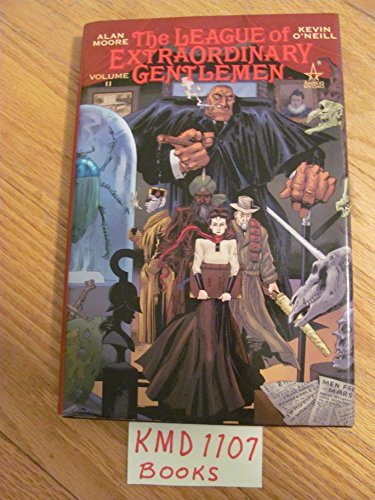The League of Extraordinary Gentlemen--comprised of Captain Nemo, Allan Quatermain, the Invisible Man, Mina Murray, and Dr. Jekyll and Mr. Hyde--find themselves dealing with Martian heat rays and each other in 1898 London.
The League of Extraordinary Gentlemen Volume II finds cocreators Alan Moore (writer) and Kevin O'Neill (artist) back on familiar ground, revisiting the classic Victorian-era characters that they used to such effect in the bestselling and rightfully acclaimed first volume. It's a superhero tale, but--as expected from Moore--a rather unconventional one. This League is drawn from some of the classic characters from English literature: Alan Quatermain, Captain Nemo, Hawley Griffin (the Invisible Man), Mr Hyde and Miss Mina Murray (formerly Harker, the heroine of
Dracula). And this tale is taken directly from HG Wells' classic
War of the Worlds, as Martian invaders (complete with tripods and heat rays) begin to land in England, bent on conquest. They seem unstoppable as they rage across the countryside towards London, but they hadn't counted on the League, or the eccentric genius of Dr Alphonse Moreau.
As with the first League of Extraordinary Gentlemen, it's the meticulous sense of era and place that makes volume II a success. The minutia of Victorian England is set seamlessly alongside objects and ideas that never appeared outside of myth and legend, while references to other famous fictional characters and events are casually introduced, then quickly tossed aside. And, of course, it's a ripping yarn, in the classic Boys' Own style (right down to the cliff hanger-style, end of chapter narrations). However, unlike volume I, there are several scenes that aren't suitable for all readers (particularly "those of a delicate disposition"). It's almost as if Moore and O'Neill, anticipating the heightened interest that 2003's League of Extraordinary Gentlemen film would bring, have willingly set out to shock and even alienate newer readers. So there's a fairly explicit sex scene, some rather brutal violence and, perhaps most unnerving, it's almost inevitable that no reader will ever look at Rupert the Bear in the same way again. --Robert Burrow
